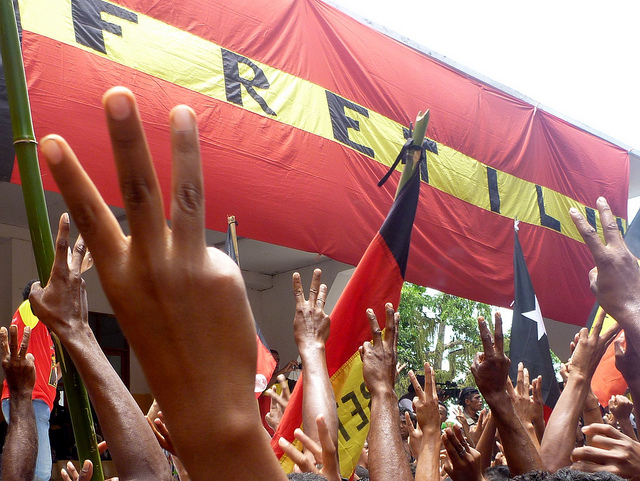A shotgun marriage and a blank cheque: political and economic trends in East Timor

On 26 October 2015, East Timor’s Audit Chamber vetoed the largest contract in the country’s history—worth US$719 million dollars—for ‘
non-compliance with basic standards in force in Timor-Leste’. This contract was part of a highly ambitious ‘resource corridor’ intended to span the country’s entire south coast.
That a project of this magnitude didn’t go through the most basic due diligence checks is significant for what it tells us about the East Timorese government’s current political and economic trajectory.
While a number of recent political developments have generated considerable discussion, the increasing centralisation of power is a constant undercurrent. In early 2015, the incumbent Prime Minister, Kay Rala ‘Xanana’ Gusmão, stepped down and appointed former
Frente Revolucionária de Timor-Leste Independente (FRETILIN) Health Minister Dr Rui Maria de Araújo in his place, and a number of other FRETILIN members to key roles and positions.
While that move took most observers by surprise, it had long been rumoured. In some respects it’s a welcome rapprochement. Personal enmity between Gusmão and the leader of FRETILIN, Mari Alkatiri, was one of the key drivers of the 2006 violence. Elections became a bitter theatre for historical enmities between the two camps thereafter. De Araújo is also widely respected as a competent technocrat and there are indications he’s embarked on a modest reform mission in the civil service.
It isn’t such a victory for democracy. East Timor’s governance system was already highly centralised before this new arrangement. Major spending decisions were made by Gusmão and a small coterie of
unelected confidantes, largely bypassing any regulatory oversight.
Now, rather than stepping aside as such a move would suggest, Gusmão has actually increased his control. His new self-designed role as Minister of Planning and Strategic Investment retains almost total power over the capital budget, embracing all major infrastructure planning and investment and oversight of the two main regulatory bodies.
The incorporation of senior FRETILIN leaders into government posts has also removed the only effective source of opposition. With Ministerial appointments filled by Gusmão loyalists, there are currently few sources of dissent—the National Parliament, for example, unanimously approved the last budget.
A new president has also just been elected, the FRETILIN member Francisco Guterres ‘Lu-Olo’, but his success can be clearly attributed to Gusmão’s endorsement. Guterres was quick to indicate that he won’t rock the boat. Gusmão remains the unofficial president, albeit with executive powers not detailed anywhere in the Constitution.
Such a centralisation of power has far reaching implications. The government has embarked on a raft of ambitious but increasingly controversial mega-projects. One is the south coast project, which includes an autobahn-like highway, a refinery, an airport and dedicated port—with the ill-fated sea wall. In the isolated Oecusse enclave, construction for a Special Zone for Social Market Economy (ZEESM) (headed by Alkatiri) is already well underway. Drastically under costed and with little regard for detailed feasibility studies, those projects have the potential to bankrupt the state.
The Tase Mane project, for example, is premised on Timor winning the majority of the Greater Sunrise gas field. Without the skilled workforce or extant industrial sector to benefit from such a massive investment, the economic justification alone is so tenuous this investment should never have been countenanced. Given the likelihood that Greater Sunrise may not be developed for at least ten years—if at all—and, that Timor is by no means guaranteed a lion’s share of that field under current median line negotiations, Tase Mane should be shelved indefinitely.
According to local NGO
La’o Hamutuk, the Oecusse ZEESM project has already received almost $500 million in public funds over the last three years. While its project documents list a range of risible fantasies such as a ‘Centre for Excellence in Ethical Investment’, the centerpiece of this project is a planned light manufacturing hub. A 2016
World Bank report commissioned by the ZEESM Authority comprehensively rebutted government feasibility arguments.
Oecusse isn’t on an international shipping route, for example, and it’s highly unlikely that the enclave will ever generate sufficient industrial output to change that. This fact in itself should be enough to stop the project in its tracks. As with the South Coast project, investors have not been queuing up. Nonetheless, work continues, for example, on construction for a planned international airport. Where the passengers will come from is unknown, but like many other such ventures, economic or development outcomes seem to be a distant secondary consideration.
In July this year, East Timor will go into its third full parliamentary election. Despite a strong challenge from the nascent reform-minded People’s Liberation Party, the dominance of Gusmão’s
Congresso Nacional da Reconstrução Timorense (CNRT) and FRETILIN is unlikely to change. Neither, therefore, is the nation’s current spending regime.
Petroleum revenues are estimated to end around 2021, yet the government has consistently withdrawn funds from the Petroleum Fund at more than a sustainable rate. As a consequence, East Timor is likely to run out of money within the next decade.
An Australian academic recently drew a vitriolic response from East Timor’s former President, Jose Ramos Horta,
for her statement that East Timor may be architects of their own demise. Unless current spending trends are reversed, however, this isn’t a matter of opinion, but a mathematical certainty.
 Print This Post
Print This Post